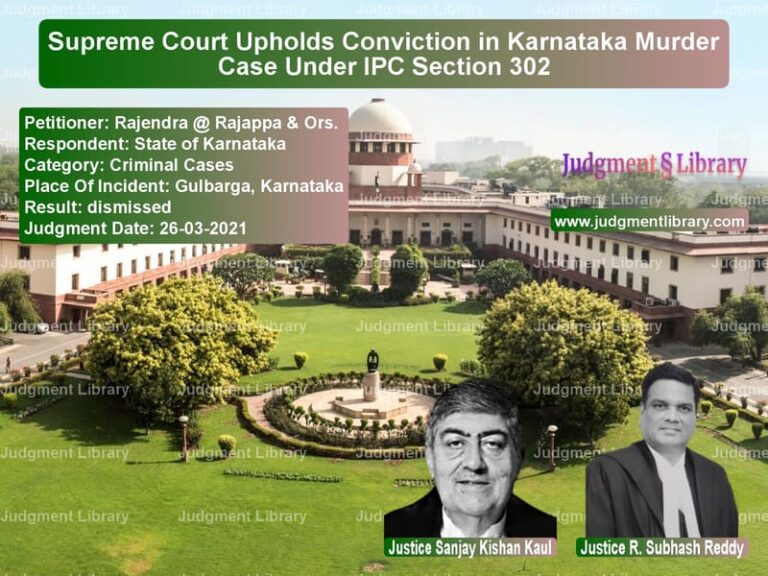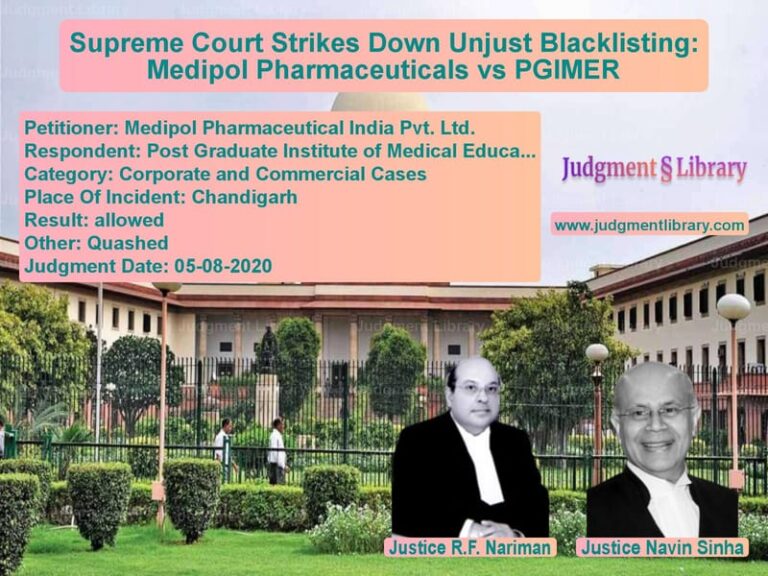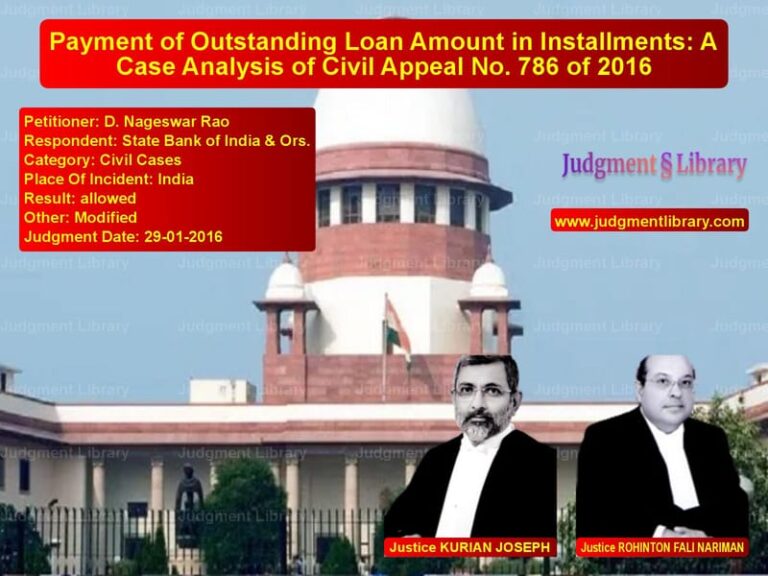Supreme Court Overturns High Court Remand Order in Decades-Old Property Dispute
The Supreme Court of India recently delivered a significant judgment in the case of R. Nagaraj (Dead) Through LRs. and Another vs. Rajmani and Others, setting aside the High Court’s order that had remanded a decades-old property dispute back to the trial court. The bench comprising Justices J.B. Pardiwala and R. Mahadevan restored the concurrent findings of the lower courts which had dismissed the suit as barred by limitation, bringing finality to a legal battle that spanned over four decades.
The complex litigation traces its origins to 1965 when a maintenance suit (O.S.No.851 of 1965) was filed by Sunderammal and Vennila (Respondent Nos.6 and 7) against Samiappan and his family members. The suit was decreed on 26.08.1965, leading to attachment and court auction of the suit ‘A’ schedule property in 1970. The property changed hands multiple times through registered sales, ultimately being purchased by the appellants in the present case. In 1982 – seventeen years after the original decree – Respondent Nos.1 to 3 (daughters and wife of Dasappa Gowdar) filed a fresh suit (O.S.No.257 of 1982) seeking to set aside the 1965 decree and partition the properties.
The appellants’ counsel argued vehemently that ‘Respondent Nos.1 to 3 had been arrayed as respondents/judgment debtors in the execution proceedings initiated in O.S.No.851 of 1965 and hence, they had the knowledge of the proceedings even prior to filing of the suit in O.S.No.257 of 1982. Since the second suit was filed after a period of 17 years, it was hopelessly barred by limitation.’ They further contended that ‘the High Court ought to have decided the question of law relating to limitation, instead of remitting the case to the trial Court, specially, after more than two decades from the inception of the Second Appeal.’
On the other side, the respondents’ counsel maintained that ‘the High Court rightly allowed the second appeal filed by Respondent Nos.1 to 3 and remitted the matter to the trial Court for fresh trial, after framing the issue of limitation.’ They argued that ‘the said issue is a mixed question of fact and law’ and relied on precedents including Vaish Aggarwal Panchayat v. Inder Kumar & Others and Ramesh B. Desai & Ors. v. Bipin Vadilal Mehta & Others.
The Supreme Court, in its detailed analysis, emphasized that ‘Section 100 CPC confers jurisdiction on the High Court to entertain a second appeal, only when it is satisfied that the case involves a substantial question of law.’ The Court quoted extensively from its earlier decisions including Santosh Hazari v. Purushottam Tiwari and Surat Singh (Dead) v. Siri Bhagwan & Others to underscore that ‘once the High Court is satisfied that the appeal involves a substantial question of law, such question shall have to be framed and finally decided on merits in accordance with the procedure laid down under section 100 CPC.’
The judgment meticulously examined the trial court’s findings which noted that ‘the relief sought by Respondent Nos.1 to 3 to set aside the decree passed in the first suit was hit by the doctrine of limitation’ as the suit was filed seventeen years after the decree. The First Appellate Court had affirmed this view, observing that ‘the plaintiffs have slept over for 17 years and had chosen to come to the court violating the mandate under Section 59 of the Limitation Act.’
The Supreme Court strongly criticized the High Court’s approach, stating that ‘the judgment of the High Court is unsustainable’ as it failed to decide the substantial questions of law framed at admission and instead remanded the matter solely on the limitation issue. The Court observed that ‘the failure of the trial Court and the First Appellate Court to formulate a separate issue, in the view of this Court, is not fatal to the judgment rendered by them and has not caused any prejudice to the parties.’
In its concluding remarks, the Court emphasized the importance of finality in litigation, noting that ‘limitation is a matter of statute and must be strictly enforced, more so when the earlier transaction or sale is well within the knowledge of the parties.’ The bench allowed the appeal, set aside the High Court’s judgment, and restored the trial court’s decree dismissing the suit. This judgment brings closure to a protracted legal battle while reinforcing important principles regarding limitation, procedural laws, and the scope of second appeals under Section 100 CPC.
Petitioner Name: R. Nagaraj (Dead) Through LRs. and Another.Respondent Name: Rajmani and Others.Judgment By: Justice J.B. Pardiwala, Justice R. Mahadevan.Place Of Incident: Coimbatore, Tamil Nadu.Judgment Date: 08-04-2025.Result: allowed.
Don’t miss out on the full details! Download the complete judgment in PDF format below and gain valuable insights instantly!
Download Judgment: r.-nagaraj-(dead)-th-vs-rajmani-and-others-supreme-court-of-india-judgment-dated-08-04-2025.pdf
Directly Download Judgment: Directly download this Judgment
See all petitions in Property Disputes
See all petitions in Succession and Wills
See all petitions in Landlord-Tenant Disputes
See all petitions in Damages and Compensation
See all petitions in Contract Disputes
See all petitions in Judgment by J.B. Pardiwala
See all petitions in Judgment by R. Mahadevan
See all petitions in allowed
See all petitions in supreme court of India judgments April 2025
See all petitions in 2025 judgments
See all posts in Civil Cases Category
See all allowed petitions in Civil Cases Category
See all Dismissed petitions in Civil Cases Category
See all partially allowed petitions in Civil Cases Category







